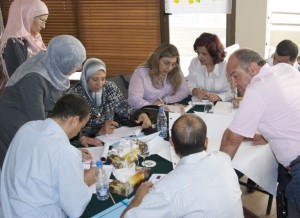Rapid content development
I am very privileged to be working on a project with the UN at the moment. I am helping to develop a leadership programme for Head teachers. What makes this project particularly exciting and important is that these are Principals from schools inside Palestinian refugee camps.
UNRWA supports nearly 700 schools across the Middle East for refugees that have been stateless for more than 70 years in some cases. Whatever one thinks of the politics, no-one can deny the deplorable conditions that hundreds of thousands of children live in. Like many around the world, the Agency believes that education is the key to change, and in the absence of support from the countries that host the camps, it has committed to providing schools for the young people. The project I’m working on complements another being developed for teachers and together they are the heart of an ambitious reform strategy for educational provision.
I’m in Beirut with a friend and colleague, Karen Ardley, working with a team of writers comprising Palestinian Head teachers and School Supervisors. It is a powerful learning experience for me both in terms of the context and our way of working.
We’re rapidly prototyping content.
I’ve worked on lots of projects where the content has had to be polished and signed-off before being passed to web developers. It’s an approach that causes all kinds of problems – the disconnect between content and presentation is potentially catastrophic, the transfer from one format to another can change meaning and emphasis and the late arrival of material reduces the time for any type of meaningful testing. They are the reasons we’re doing this differently.
Using WordPress I’ve build a website very quickly. The standard Dashboard offers familiar word processing functionality and its Widgets and Plug-ins deal with all of the complicated interactions and add some ‘bells and whistles.’ Through it, I’ve provided a highly flexible platform to develop content immediately. The team is writing straight to screen (albeit to a private site at this stage).
Working in this way means that the whole team, split across the five territories or ‘fields’, can see the programme as it develops.
This methodology is raising its own challenges: It is hard to share content that you know isn’t finished, it’s easy to become distracted by appearance and lots of opinions can cause paralysis, but these are issues in any project – our approach merely brings them to the surface.
We’ve worked hard during this week’s workshop to establish an atmosphere of trust and common purpose that will sustain a writing process which exposes work-in-progress to ‘public’ scrutiny. The benefits of this vulnerability is content that draws on the expertise of the community, a clear sense of progress and material that is visible from the start.
We’re all hoping that when the programme launches next year, the improved leadership in schools will transform the lives of children across the Middle East. It’s a project not lacking in ambition.


Trackbacks/Pingbacks
[…] is out! http://bit.ly/dByO0A ? Top stories today via @ict4d @rlinfoservices @anguswillson, Rapid content development | Play with Learning RT @carlton: Rapid content development – producing materials for schools in Refugee camps. […]